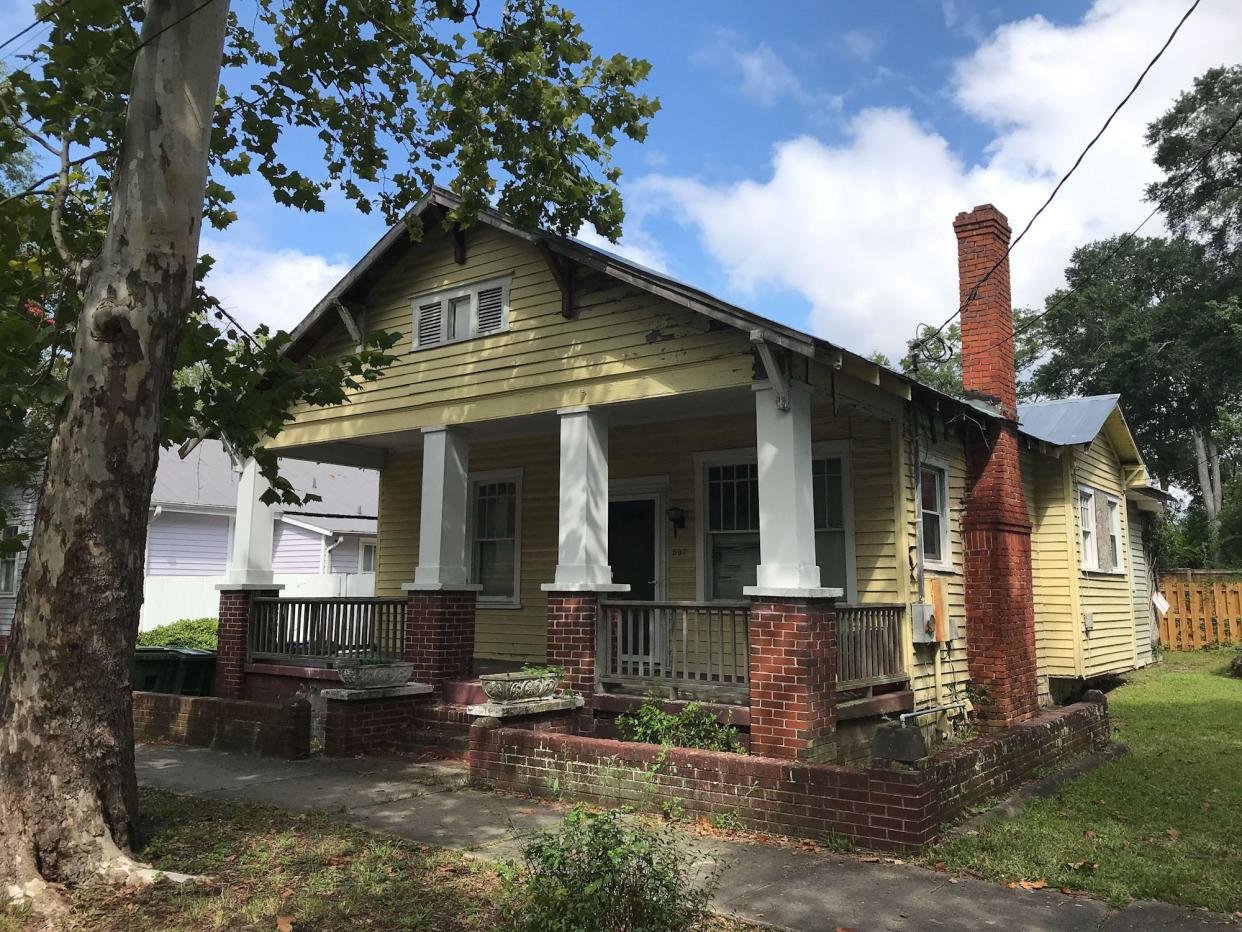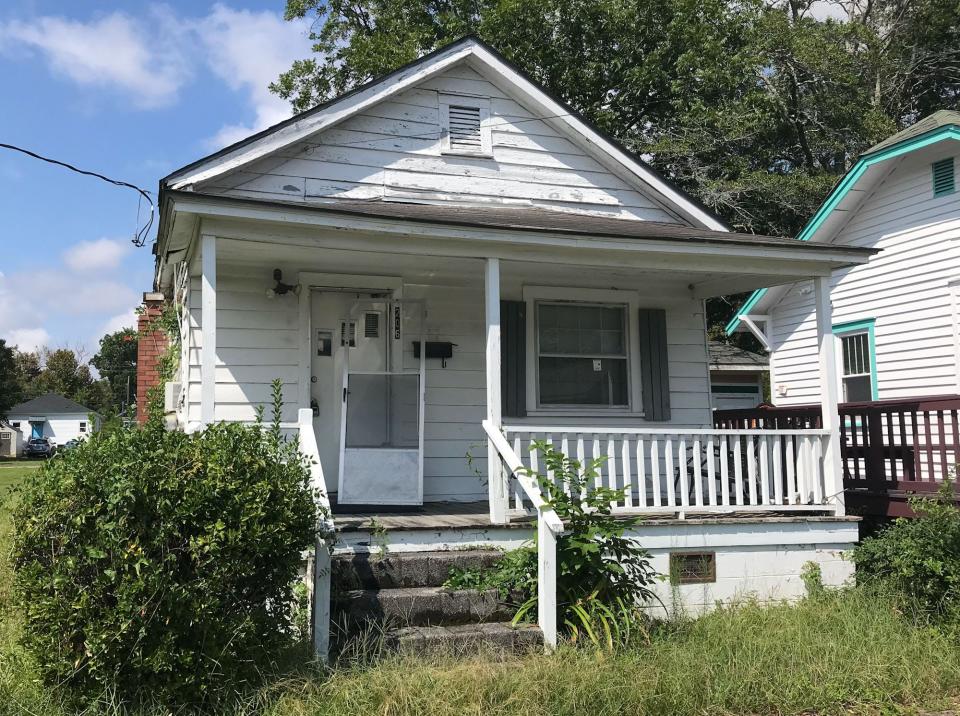How some groups are fighting to stop 'predatory' real estate practices in Wilmington

Dolly Rheddick grew up in Wilmington, graduated from Hoggard High School and, even though she now lives in Winston-Salem, maintains ties to the area and has family in the Port City.
For years, Rheddick, 67, has paid the property taxes on a house owned by her late grandparents, Willie and Dolly Nixon, at 206 S. 12th St. and on a house owned by her late parents, Theodore and Dorothy Rheddick, at 507 Nun St.
Property records list both houses as being owned by the heirs of her parents and grandparents. But Rheddick said she's worried that her family might be forced into an unwanted sale of both houses after some of the eight heirs to the properties accepted money for their shares earlier this year.
The real estate website Zillow estimates the value of the Nun Street house at more than $220,000 but says it was "sold" May 11 − for $10,000. Zillow estimates the value of the 12th Street house at over $140,000 and notes it was "sold" May 2 for $12,500. The lower numbers likely represent money paid to heirs for their portions of the houses, and not a full sale.
Once a person, like a real estate speculator, acquires partial ownership of what's known as "heirs' property" − which results when a person dies without a will, or their will never goes through probate court − they can go to court to force a sale.
Experts say practices such as these, which can strip generational wealth from families and disproportionately impact low-income individuals, the elderly and people of color, have existed in Wilmington for years. But, with the recent explosion in property values locally, these practices are on the rise. Some people and groups are trying to put a stop to it, using education and other tactics.
'Predatory real estate practices'

Rheddick said her brother lived in her parents' house until he died about a year ago, and her aunt lived in her grandparents' house until she died about five years ago. The houses are now unoccupied, but for years, "Whatever needed to be fixed, I fixed it," she said. "No one was interested in these houses."
Both are now in poor condition, with boarded-up windows, peeling paint and other issues.
But with property values in Wilmington skyrocketing, even homes in poor condition in the desirable downtown area are commanding top dollar. Rheddick said she started getting lots of phone calls earlier this year about selling the houses. One man even came to her home in Winston-Salem multiple times "pretty much demanding" that she sell. Rheddick said she told him she wasn't interested.
Related coverage: Her family has called the Northside home for 150 years. Now that history is disappearing.
Apparently, Rheddick said, some of her fellow heirs eventually accepted money on what appear to be lowball offers for their shares.
"He went behind my back to the heirs," Rheddick said, adding that the situation has caused "a lot of problems" in her family.
Liz Carbone is vice-chair of the Cape Fear Housing Coalition, a nonprofit focused on helping people in the community find safe and affordable housing. Carbone said she couldn't speak to Rheddick's situtation specifically, but said she's seen other cases where property owners have died without wills, leaving multiple heirs.
"That opens the door for predatory real estate practices," she said. "It's been a problem for a long time, but it's just now making it into the public discourse. We're seeing it a lot (in Wilmington) on the Northside and the south side. People go into neighborhoods and look for homes that are unoccupied or are maybe in disrepair."
Resources for help
Earlier this month, the Cape Fear Housing Coalition and Cape Fear Habitat for Humanity began a series of events called the Community Homeowner Education Series & Wills Clinic.
Topics include property tax relief for low-income seniors and veterans, dealing with issues that come with property owned by multiple heirs and, on Oct. 11, a free wills clinic.
Similar events have been held in the past, Carbone said, but the need is especially acute this year.
"This is our effort to connect with senior home owners in the area," Carbone said. "We need to keep an eye on creating new housing, but we also need to protect these generationally owned properties. They've done the hard work, their home might be fully paid off, but they might not have the ability to maintain it as they grow older, or to pay property taxes when they have a fixed income."
"We want to make sure the homeowners' wishes are honored, and protect that generational wealth," she added.
Wilson Greene is a lawyer with the Land Loss Prevention Project out of Durham, which was formed in 1982 by the North Carolina Association of Black Lawyers "to curtail epidemic losses of Black-owned land in North Carolina," according to its website.
On Sept. 28, as part of the Community Homeowner Education Series, Greene will speak about heirs' property issues at the Warner Temple AME Zion Church in Wilmington.
"It's a tale as old as time, and increasingly common," Greene said, speaking about the problem in general and not any specific situation. "Outside investors have learned they can buy to force a sale and purchase the property for much less than it would be on the open market. This makes heirs property owners incredibly vulnerable."
Many of the practices employed to acquire heirs property are legal, Greene said, but can sometimes cross the line into fraud.
"Have I seen things that are borderline fraudulent, shady? Yes," Greene said.
But there's nothing illegal, he added, in an heir selling their partial interest in a house and "them not knowing the house could then be sold out from under the family."
There are several legislative efforts at the state level that would help protect heirs' property owners, Greene said, and "the issue is becoming more known. But, downtown Wilmington, this is where it's happening," especially in areas with large numbers of low-income Black residents.
Rheddick, who is Black, said she has started to explore her legal options to see if she has any recourse, but the process is complex and daunting.
Part of the problem, Rheddick said, is that her family "never talked about it." Before her aunt died, Rheddick said, her aunt asked Rheddick to make sure that her daughter, Rheddick's cousin, "will have lifetime rights" to the 12th Street house.
She said she believes she and her family have been taken advantage of, and like "the property was stolen from us."
"When you get into word-of-mouth deeding it gets complicated," Carbone said. "It gets even more complicated when it's embroiled in drama and family history."
Even if some of these practices are technically legal, Carbone added, "When you have generational residents who might have been living in a property for 60 years, and then you have someone trying to get them out just so they can make a profit, well, that tells you everything you need to know about that person."
Want to go?
What: Community Homeowner Education Series & Wills Clinic, presented by the Cape Fear Housing Coalition and Cape Fear Habitat for Humanity
Sept. 21: Legal Aid NC and the Financial Protection Law Center will help senior homeowners learn how to create a will and how to apply for property tax relief. 10 a.m.-noon at the Nir Family YMCA, 2710 Market St.
Sept. 28: The Land Loss Prevention Project will discuss how to prevent heirs' property issues with your home and help families currently struggling to resolve heirs' property issues. 10 a.m.-noon, Warner Temple AME Zion Church, 620 Nixon St.
Oct. 11: All day clinic will help senior homeowners establish a will to ensure their home transfers legally to their loved ones in the future. Attorneys and notaries will be on site. 10 a.m.-4 p.m., location TBD.
All sessions are free and open to the public, but registration is required. Register here or call Gabriel Guerra at 910-762-4744, ext. 134.
This article originally appeared on Wilmington StarNews: Wilmington groups are trying to stop 'predatory' real estate practices

